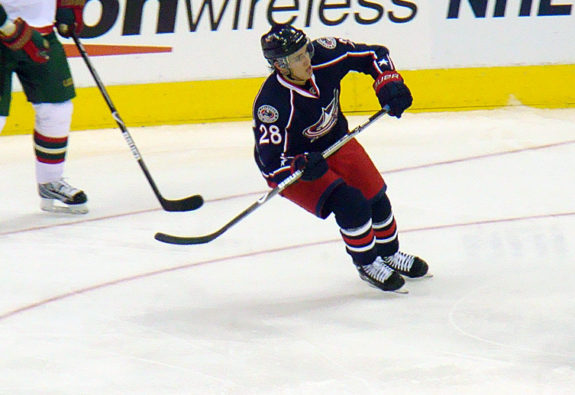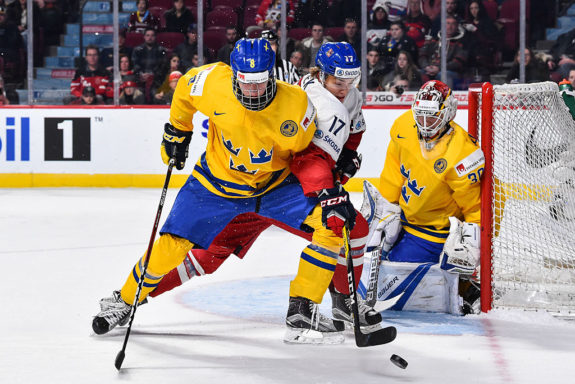The World Junior Championship might be the best two weeks of the hockey season. From Dec. 26 to the first week of January, top prospects from all over the world compete to see which nation is worthy of a gold medal. It’s a badge of honour to be selected to represent your country, and it can be a great sign of things to come for fans. It’s impossible to know how success at this tournament will translate into the future, but that doesn’t matter here; at the World Juniors, anything is possible.
However, when a player dominates the tournament, it’s hard not to get excited, and the Ottawa Senators are no strangers to watching their top prospects thrive at the World Juniors. Since their inaugural NHL season in 1992-93, many future Senators played in the tournament, and this year, two more – Jorian Donovan and Kevin Riedler – will join the ever-growing cohort.
Over the years, a few performances have stood out, igniting a fan base’s passion and excitement for the future of their team. Here are the five best performances by a Senator at the World Juniors.
5. Andre Petersson – 2010
Most fans may not be familiar with Andre Petersson, as he only played a single game for the Senators in 2011-12 and was quietly dealt to the Anaheim Ducks for Alex Grant in 2014. But he put together one of the greatest World Junior performances of the last 20 years.
Petersson was drafted by Ottawa in the fourth round of the 2008 NHL Draft, following a strong season in Sweden’s SuperElit junior league, and in 2008-09, he made his Swedish Pro debut in the Elitserien. That season also saw him selected to the Swedish World Junior team alongside Ottawa’s 2008 first-round pick, Erik Karlsson, and in six games, he finished with a respectable three goals and six points before falling to Canada in the Final.
Related: 2024 Guide to the World Junior Championship
While Karlsson left for North America for the 2009-10 season, Petersson stayed in Europe and returned to Team Sweden in 2010, along with future Senators Magnus Paajarvi and David Rundblad. Although the team lost a significant chunk of talent, they looked far more dangerous thanks to Petersson. In six games, he put up eight goals, which tied Jordan Eberle for the lead, and his 11 points ranked sixth in tournament scoring. However, the Swedes fell apart against the Americans, losing 5-2 in the semi-final, which sent them to the bronze medal match against Switzerland. In one of the most uneven matches in a medal round, Petersson scored a hat trick to help Sweden easily win 11-4 to claim third place.
4. Nikita Filatov – 2009
Nikita Filatov is another easily forgotten Senator, playing just nine games in 2011-12, but he wasn’t supposed to be. The sixth-overall pick in 2008 was seen as the second-best forward available in the draft behind Steven Stamkos, and had there not been a group of highly-touted defencemen in that group, he could have gone even higher.
He scored nearly a goal a game in his draft year and put up nine points at the 2008 World Juniors, prompting the Columbus Blue Jackets to select him over defenceman Tyler Myers. He made his North American debut the following season but struggled to adapt to coach Ken Hitchcock’s defensive system, leading to a demotion to the minors and eventual loan to the World Juniors.

Finally allowed to play his style of game, Filatov went on a tear with the Russians in Ottawa. At the end of the four-game round-robin, he had five goals, and he added one more against the Czechs in the quarterfinal. The Russians were unable to sustain the dominant Canadians in the semifinal, falling 6-5 in overtime, but they came back to defeat the Slovaks in the bronze medal match, where Filatov scored another two goals. With a total of eight goals, he tied John Tavares for the tournament lead and was the only Russian selected to the All-Star team. No other Russian since 1992-93 had scored as many goals as the talented sniper until Kirill Kaprizov broke his record in 2017 with nine.
3. Filip Gustavsson – 2018
Sweden has been blessed with excellent goaltending over the past decade at the World Juniors. Since 2014, a Swede has won the International Ice Hockey Federation’s (IIHF) top goaltender award five times, including back-to-back titles in 2016 and 2017. So, when Filip Gustavsson was named the team’s starter in 2018, there was a lot of pressure to follow up those fantastic performances with another. A 2016 second-round pick of the Pittsburgh Penguins, he was pegged as the team’s starter after serving as the backup for Felix Sandstrom in 2017, and despite a rocky 2017-18 season to that point, he had the talent to be a big performer at the tournament.

However, few could have anticipated how big. Gustavsson finished the 2018 World Juniors with a 1.81 goals-against average (GAA) and a .924 save percentage (SV%), with his crowning moment coming against the defending champions, the United States in the semi-final. He turned away all but two of 31 shots from the tournament’s goal leader Kieffer Bellows and points leader Casey Mittelstadt, forcing them to settle for the bronze medal.
The Swedes then faced Canada in the final, and once again, the Swedish netminder stood on his head, stopping 25 of 28 shots, but lost 3-1. Despite the disappointing finish, he walked away with the best goalie award, giving Sweden a three-peat in the category, as well as the lowest GAA, and he was named to the All-Star team. Not even Sandstrom had accomplished that.
It was in that game against the Americans that Gustavsson likely popped up on the Senators’ radar, who were no doubt closely analyzing Brady Tkachuk, whom they selected with the third-overall pick that June. But just a month after the tournament concluded, Ottawa struck a trade with the Penguins, sending Derrick Brassard to Pittsburgh in a three-team deal that resulted in the Senators adding Gustavsson, who was billed as the team’s goalie of the future until he was moved to the Minnesota Wild in 2022.
2. Tim Stutzle – 2021
After four years in Division 1A, Germany finally returned to the top group at the 2020 World Juniors in Třinec and Viktovice, Czechia, thanks to Moritz Seider and Dominik Bokk, both of whom were already selected in the first round of the NHL Draft. But everyone was more interested in the trio of 17-year-olds: John-Jason Peterka, Lukas Reichel, and Tim Stutzle. The Germans managed to win just one game in Czechia, with Stutzle finishing the tournament with the second-most assists among Germans.
That one win was enough to keep Germany around for another year, which meant the world would get a second look at Stutzle, who was selected third overall by the Senators in the NHL Draft, and company, and the group did not disappoint. By the end of the round-robin, Stutzle led the team with five goals and tied Peterka for the lead with 10 points. No other duo from any other nation had a higher point-per-game rate, earning Germany their first playoff berth in tournament history.
Germany’s magical run ended in disappointment after falling 2-1 to the Russians, but it didn’t change the fact that Stutzle was one of the most impressive players at the games. He was named to the tournament’s All-Star team and walked away with the Best Forward award, becoming the first and only German to win it. To compare, Leon Draisaitl was never named to the tournament All-Star team, although his NHL numbers have more than made up for the perceived slight. Maybe Stutzle will follow in his fellow countrymen’s footsteps and become the next great German superstar.
1. Thomas Chabot – 2017
A year after going 18th overall to the Senators, Thomas Chabot made his World Junior debut at the 2016 tournament in Helsinki, Finland. Despite being the youngest defenceman on Canada’s roster, he was one of the best, scoring three assists in five games to lead the blue line in scoring. However, that year ended in defeat for the Canadians after they gave up a 2-0 lead to lose 6-5 to the hosts, who captured the gold medal.
Chabot returned in 2017 as one of five returnees, forming a strong leadership core that was determined not to collapse again. But no one was more determined than the Senators’ defenceman. In seven games, he put up a team-leading 10 points, while his four goals finished second. Although the tournament ended bitter-sweetly for Canada, who lost in the final to the Americans, there was no doubt that Chabot was one of the best players at the tournament. For his incredible performance, he was named to the tournament All-Star team, as well as the Best Defenceman and Tournament MVP.
Chabot’s 10 points ranked fourth among all-time Canadian defencemen at the World Juniors, just behind Alex Pietrangelo, Bryan McCabe, and Olen Zellweger. His four goals, however, rank first, tying with Kris Russell. Unfortunately, Chabot is the only one on that list to never win a gold medal, but his impact managed to spread far beyond the Canadian borders. His dominance in 2016 caught the attention of a 12-year-old Tomas Hamara, who went on to be selected by the Senators in the third round of the 2022 Draft and is now playing in his third World Junior tournament for Czechia. Given his potential, he may get the chance to play with his childhood idol in the next couple of years.
Anything Can Happen at the World Juniors
It was surprising to discover that Daniel Alfredsson, Craig Anderson, and Zdeno Chara never suited up at the World Juniors. Marian Hossa represented Slovakia twice but was strangely never the team’s top scorer, nor was Mika Zibanejad, who finished his only World Junior appearance with just four goals and five points, although he did capture a gold medal.
However, for every player featured on this list, there could have been three more. Derek Stepan put up one of the greatest World Junior performances ever after scoring five goals and 15 points to lead the USA to a gold medal in 2010. Mark Stone was one of the best centers at the 2012 tournament, leading Canada with seven goals, 10 points, and a 73.08% faceoff win percentage. Dion Phaneuf played in two World Junior Championships in 2004 and 2005 and was named to the All-Star team both times, but was the tournament’s best defenceman in his second go-around. Marek Svatos, who briefly played with Ottawa in 2011, scored seven goals in seven games for Slovakia in 2002 and led the scoring race, earning him an All-Star nod, but failed to secure a medal for the team.
It just goes to show that, truly, anything can happen at the World Juniors. Prospects who never make the NHL can lead the tournament in scoring, while others who struggle to find their game can go on to become Hall of Famers. It’s what makes this tournament so special – anyone can be a national hero, and watching it unfold is one of the greatest experiences for any hockey fan.
